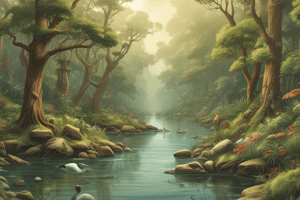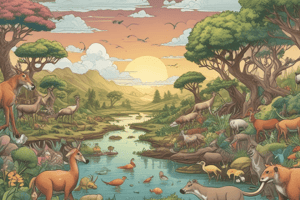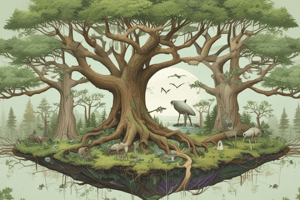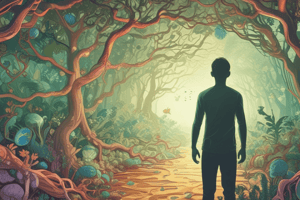Podcast
Questions and Answers
What is the primary focus of botany within the branches of biology?
What is the primary focus of botany within the branches of biology?
- Study of animal behavior
- Study of microorganisms
- Study of chemical processes
- Study of plant life (correct)
Which of the following characteristics is unique to heterotrophs?
Which of the following characteristics is unique to heterotrophs?
- They can produce their own food through photosynthesis.
- They must consume other organisms for energy. (correct)
- They lack a cell wall.
- They reproduce asexually.
Which branch of biology specifically studies diseases?
Which branch of biology specifically studies diseases?
- Bacteriology
- Pathology (correct)
- Ecology
- Virology
What are chloroplasts primarily responsible for in plant cells?
What are chloroplasts primarily responsible for in plant cells?
Which of the following best defines ecology within the branches of biology?
Which of the following best defines ecology within the branches of biology?
Which process describes how plants convert sunlight into chemical energy?
Which process describes how plants convert sunlight into chemical energy?
Which group of organisms are categorized as autotrophs?
Which group of organisms are categorized as autotrophs?
Which of the following statements about cellular structure is true for plant cells?
Which of the following statements about cellular structure is true for plant cells?
Which characteristic of life involves the formation of new cells or new organisms?
Which characteristic of life involves the formation of new cells or new organisms?
Who was the first to view microorganisms?
Who was the first to view microorganisms?
What does the theory of biogenesis state about the origin of life?
What does the theory of biogenesis state about the origin of life?
Which organelle is primarily involved in photosynthesis?
Which organelle is primarily involved in photosynthesis?
What was the significant contribution of Robert Brown in cell biology?
What was the significant contribution of Robert Brown in cell biology?
Which of the following is NOT one of the four unifying themes of biology?
Which of the following is NOT one of the four unifying themes of biology?
What experiment did Spallanzani conduct to challenge the theory of spontaneous generation?
What experiment did Spallanzani conduct to challenge the theory of spontaneous generation?
What did the first cell theory proposed by Schleiden and Schwann state?
What did the first cell theory proposed by Schleiden and Schwann state?
Flashcards are hidden until you start studying
Study Notes
Branches of Natural Science
- Science originates from "socio" meaning to know and "scientia" meaning knowledge.
- Technology refers to the application of scientific knowledge.
Biological Sciences
- Zoology: Study of animals.
- Botany: Study of plants.
- Genetics: Examination of genes and heredity.
- Ecology: Relationship between organisms and their environments.
- Marine Biology: Study of oceanic organisms.
Physical Sciences
- Includes disciplines like chemistry, physics, astronomy, geology (study of Earth's structure and plate tectonics), and meteorology (study of weather patterns).
Definition of Biology
- Scientific exploration of life, focusing on living organisms.
- Two foundational areas: Botany and Zoology.
Branches of Biology
- Anatomy: Study of organism structure.
- Bacteriology: Study of bacteria.
- Biochemistry: Chemical processes within living organisms.
- Cytology: Study of cells.
- Embryology: Study of embryonic development.
- Entomology: Study of insects.
- Microbiology: Study of microorganisms.
- Mycology: Study of fungi.
- Parasitology: Study of parasites.
- Pathology: Study of diseases and their effects.
- Phycology: Study of algae.
- Physiology: Study of functions and processes of organisms.
- Taxonomy: Classification of living things.
- Virology: Study of viruses.
- Medicine: Application of biological principles to health.
- Marine Biology: Continued study of oceanic life.
Zoology in Biology
- Focused on the study of animals and their evolutionary relationships.
- Animals are heterotrophs, relying on other organisms for nutrients.
- Differ from plants by lacking cell walls and photosynthetic capabilities.
General Characteristics of Life
- Non-motile organisms may also include autotrophs, which produce their own food.
- Multi-cellular eukaryotic structure with unique organelles for various functions.
- Plant cells possess an outer cell wall, large central vacuole, and chloroplasts containing chlorophyll for photosynthesis.
Four Unifying Themes of Biology
- All organisms share a genetic blueprint: DNA.
- Cellular composition is universal among all living things.
- Common evolutionary forces lead to changes in form, structure, function, and habitat.
- All habitats share environmental factors.
Theories on the Origin of Life
- Special Creation Theory: The belief that life forms were created by a divine being.
- Spontaneous Generation: Idea that life could arise from non-living matter under suitable conditions (supported by Needham’s experiment).
- Biogenesis: Concept that life arises from existing life, demonstrated through experiments by Redi, Pasteur, and Spallanzani, the latter showing that microorganisms originate from other microorganisms.
Milestones in Cell Theory
- Robert Hooke (1665): First to observe and describe cells using a microscope.
- Antonie van Leeuwenhoek (1673): First to discover living microorganisms.
- Cell Theory Development:
- Matthias Schleiden (1838) contributed to its foundation.
- Theodore Schwann (1839) applied it to animals.
- Rudolf Virchow (1855) stated that all cells come from pre-existing cells.
Notable Scientists and Discoveries
- Zacharias Janssen (1590): Helped invent the first compound microscope.
- Robert Brown (1831): Identified the nucleus within cells.
Characteristics of Life
- Organization: Interaction of organism parts to perform functions.
- Metabolism: Chemical and physical changes occurring in an organism.
- Responsiveness: Ability to maintain homeostasis.
- Growth: Increase in organism size.
- Development: Time-based changes in an organism.
- Reproduction: Production of new cells or organisms.
- Evolution: Formation of new species or populations over time.
Studying That Suits You
Use AI to generate personalized quizzes and flashcards to suit your learning preferences.




